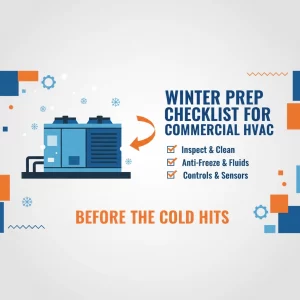Winter Prep Checklist for Commercial HVAC: Essential Steps Before the Cold Hits
When winter arrives in South Jersey, your commercial HVAC system becomes the backbone of your business operations. A well-maintained heating system keeps employees comfortable, customers happy, and operations running smoothly. But when that system fails during a February cold snap, you're looking at emergency repair costs, uncomfortable working conditions, and potential business disruptions.
The solution? A comprehensive winter preparation checklist that addresses every critical component before the first freeze hits. At South Jersey Heating and Cooling, we've seen countless businesses avoid costly winter breakdowns simply by taking proactive steps in the fall. Here's your complete guide to preparing your commercial HVAC system for the demanding months ahead.
Schedule Your Professional HVAC Inspection
The most important step you can take is scheduling a professional inspection with a qualified technician. This isn't just a suggestion: it's essential preventive maintenance that can save you thousands in emergency repairs and energy costs.
A thorough commercial HVAC inspection covers every critical component of your heating system. Your technician will examine furnaces, boilers, rooftop units, and all associated equipment to ensure peak efficiency. They'll test gas pressure, check combustion systems, inspect heat exchangers, and verify that safety controls are functioning properly.
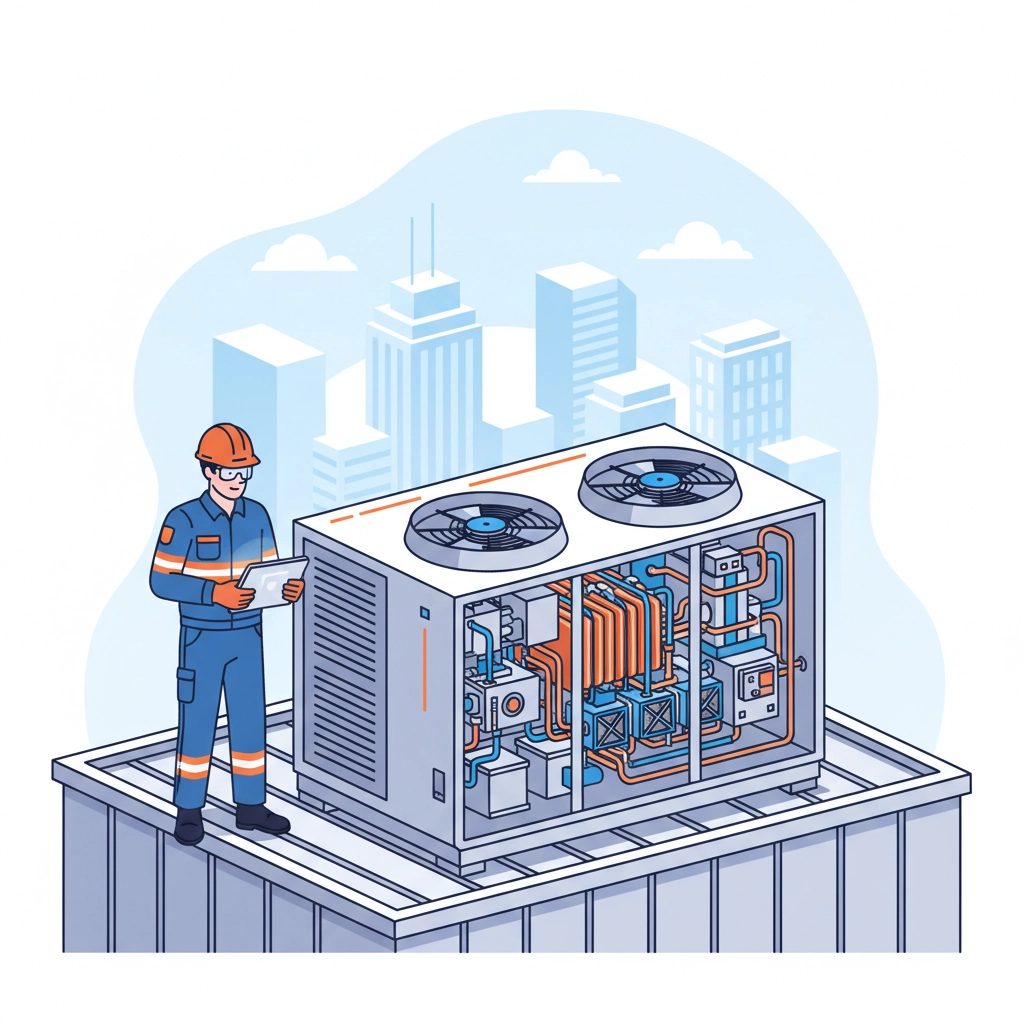
Why schedule this inspection early? Because identifying problems in October means you have time to order parts, schedule repairs, and address issues before your system is under peak demand. Waiting until December often means longer lead times for parts and higher emergency service costs.
Professional inspections also significantly reduce your energy bills. A well-tuned HVAC system operates more efficiently, and efficiency improvements of 10-15% are common after proper maintenance. For a large commercial facility, this translates to substantial cost savings throughout the heating season.
Replace Filters and Clean Critical Components
Air filters are your HVAC system's first line of defense, but they're also the most neglected maintenance item. During winter months, when your heating system runs continuously, dirty filters become a serious problem.
Replace or clean air filters monthly during heating season. For high-traffic commercial spaces, you may need to check filters even more frequently. Clogged filters restrict airflow, forcing your system to work harder and consume more energy. More importantly, restricted airflow can cause your heat exchanger to overheat, leading to expensive repairs or even system failure.
Don't stop at filters. Clean blower fans, compressors, and coils thoroughly before winter arrives. Dirty coils are one of the leading causes of HVAC inefficiency. When coils accumulate dust and debris, they can't transfer heat effectively, which reduces your system's heating capacity and increases energy consumption.
Your technician should clean these components with appropriate coil cleaner solutions and inspect them for damage. Clean components improve airflow, reduce strain on motors and compressors, and ensure your system can meet winter heating demands reliably.
Test Your Heating Systems Early
Here's a critical mistake many facility managers make: they wait until the first cold day to test their heating systems. By then, if there's a problem, you're facing an emergency situation with limited repair options.
Run your heating systems in October, well before you actually need them. This early testing allows you to identify issues like faulty ignition systems, worn belts, or failing motors while you still have time for proper repairs. It's much easier to schedule maintenance when your technician isn't responding to dozens of emergency calls.
During this test run, pay attention to unusual sounds, inconsistent heating, or any performance issues. These early warning signs often indicate problems that will worsen under the stress of continuous winter operation.
Inspect and Maintain Your Ductwork
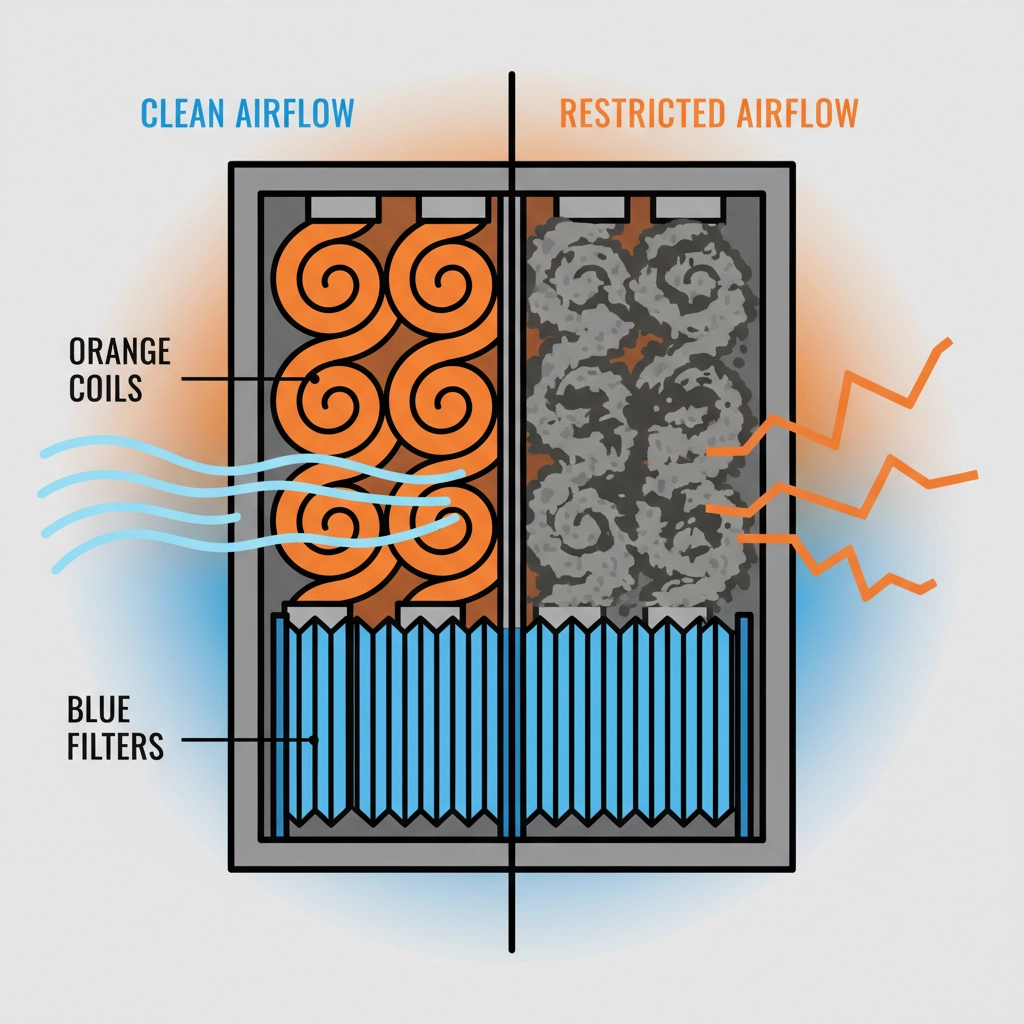
Your ductwork is the circulatory system of your HVAC setup, and even small leaks can waste significant energy. Inspect all accessible ductwork for leaks, gaps, or damage that could allow heated air to escape into unconditioned spaces.
Air leaks in large commercial buildings can waste thousands of dollars in energy costs over a single winter season. Look for obvious gaps, loose connections, or damaged insulation around ducts. Pay special attention to joints, connections, and areas where ductwork passes through walls or ceilings.
Seal any discovered leaks with appropriate materials: metal tape for metal ducts, mastic sealant for more significant gaps. Don't use standard duct tape, which fails over time and doesn't provide a lasting seal.
Also cycle dampers throughout your system to ensure they operate smoothly. Stuck or poorly functioning dampers can prevent proper heat distribution, leaving some areas of your building uncomfortably cold while others overheat.
Check Your Building Envelope
Your HVAC system works in partnership with your building's envelope: the windows, doors, walls, and roof that separate interior and exterior environments. Weaknesses in this envelope force your heating system to work harder and consume more energy.
Walk through your facility and check for air leaks around windows, doors, and loading docks. These are major sources of heat loss in commercial buildings. Feel for drafts, look for daylight around door frames, and check window seals for cracks or gaps.
Loading docks deserve special attention because they're often the largest source of air infiltration. Ensure dock seals are in good condition and dock doors close properly. Consider installing dock levelers or air curtains if cold drafts are a persistent problem.
Don't forget to inspect your building's roof before heavy snow arrives. Look for loose materials, cracks, or potential leak points. Clear gutters of leaves and debris, as clogged gutters can lead to ice dams that damage roofing and create interior water problems.
Calibrate Thermostats and Controls
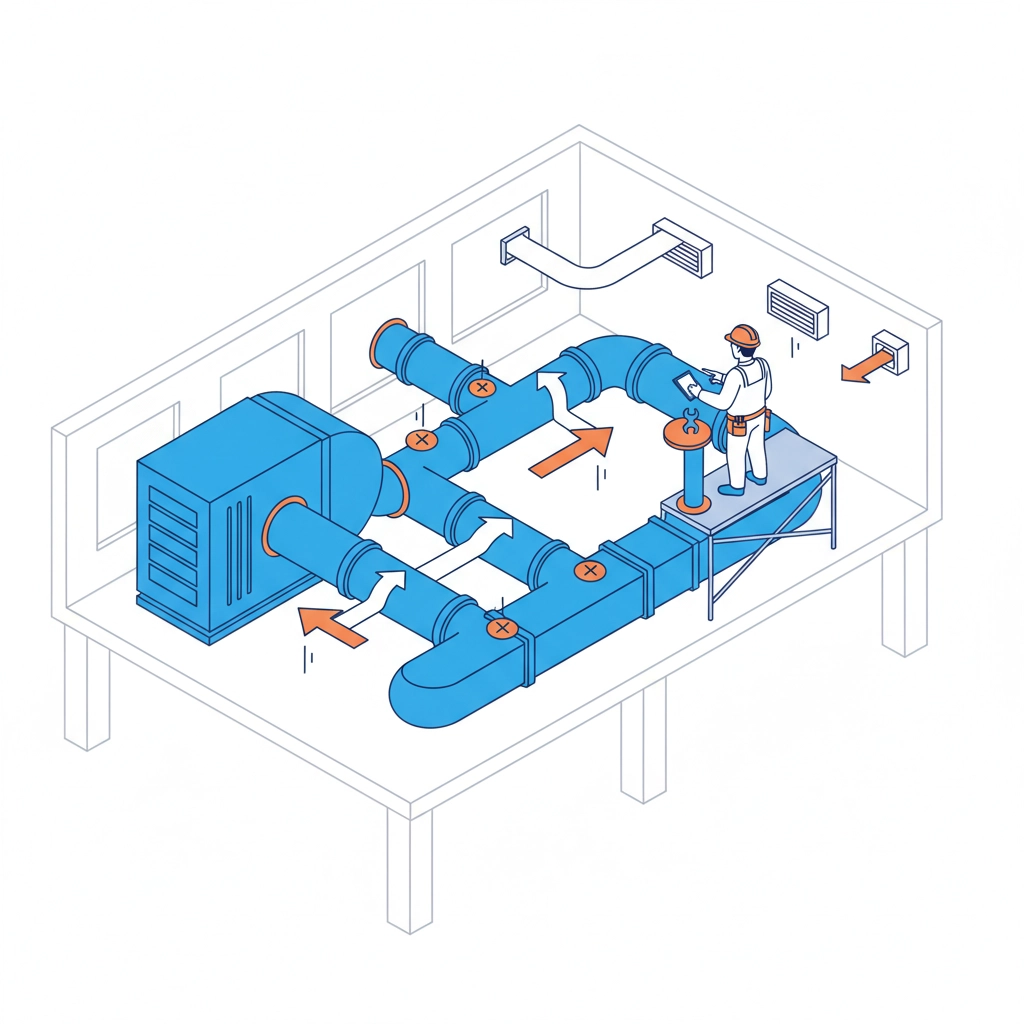
Accurate temperature control is essential for both comfort and energy efficiency. Test and calibrate all thermostats to ensure they're reading temperatures correctly and responding appropriately to setpoint changes.
For buildings with multiple zones, verify that each thermostat is controlling its designated area properly. Miscalibrated thermostats can cause significant comfort issues and energy waste. A thermostat that reads 2-3 degrees low will cause your system to overheat spaces, while one that reads high will leave areas uncomfortably cool.
Consider upgrading to programmable or smart thermostats if you're still using basic models. Modern thermostats offer features like automated setback schedules, remote monitoring, and energy usage tracking that can significantly reduce your heating costs.
Winterize Plumbing and Outdoor Systems
Frozen pipes can shut down your business operations immediately, so proper winterization is critical. Insulate all exposed pipes, especially those in unheated areas like mechanical rooms, basements, or exterior walls.
Shut off and drain exterior plumbing systems that won't be needed during winter. This includes outdoor faucets, irrigation systems, and any water lines that serve seasonal equipment. Even a small amount of water left in these lines can freeze, expand, and cause expensive pipe damage.
For facilities with rooftop HVAC equipment, ensure that drain pans and condensate lines are clear and properly insulated. Frozen condensate lines can cause water backup and damage to your equipment.
Test Safety and Monitoring Systems
Winter heating brings increased risks of carbon monoxide exposure and other safety hazards. Test all smoke detectors, carbon monoxide alarms, and building monitoring systems to ensure they're functioning properly.
Verify that emergency heating backup systems are operational. If your facility has backup generators or secondary heating equipment, test these systems now while you have time to address any issues.
Check that all safety shutoffs and emergency controls are working correctly. These systems are designed to protect your equipment and building occupants, but they can only do their job if they're properly maintained.
Prepare for Emergency Situations
Even with perfect preparation, winter weather can create unexpected challenges. Stock up on essential supplies like replacement air filters, basic tools, and emergency lighting. Keep contact information for South Jersey Heating and Cooling readily available: our emergency service technicians are available 24/7 at 609-488-2253.
Create a winter maintenance schedule that includes regular filter checks, system monitoring, and snow removal from around outdoor equipment. Blocked air intakes or exhaust vents can cause serious system problems and safety hazards.
Professional Maintenance Agreements
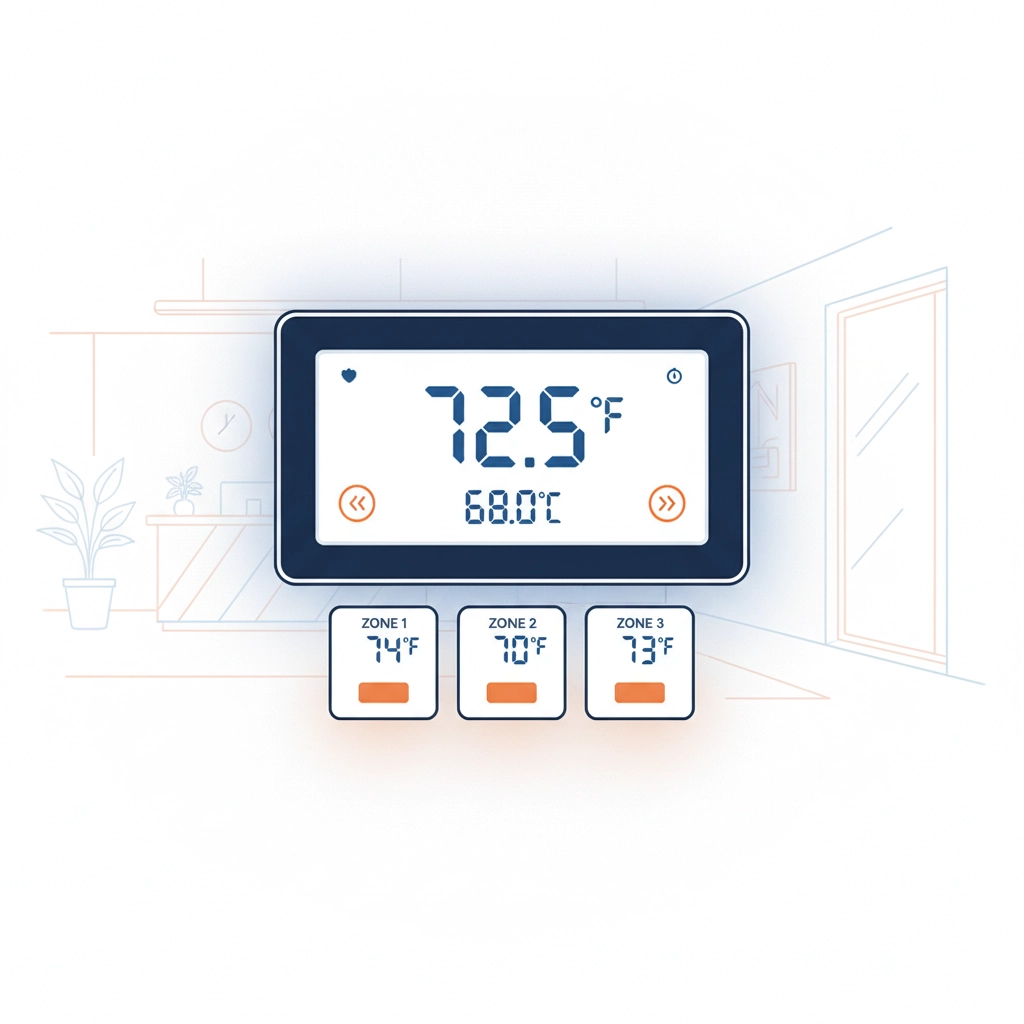
Consider enrolling in a commercial maintenance agreement with South Jersey Heating and Cooling. These programs provide regular inspections, priority service scheduling, and often include discounts on repairs and replacement parts.
Maintenance agreements are particularly valuable for commercial facilities because they ensure your systems receive consistent attention from technicians who understand your specific equipment and building requirements. Regular maintenance catches small problems before they become major failures, reducing the likelihood of emergency repairs during critical winter months.
Taking Action Before Winter Arrives
The steps outlined in this checklist represent the minimum preparation your commercial HVAC system needs before winter. However, every building is different, and your facility may have specific requirements based on its age, equipment type, and usage patterns.
Don't wait until the first cold snap to discover problems with your heating system. Contact South Jersey Heating and Cooling today at 609-488-2253 to schedule your commercial HVAC inspection and ensure your system is ready for whatever winter brings.
Our experienced technicians understand the unique challenges of commercial heating in South Jersey, and we're committed to keeping your business comfortable and operational throughout the coldest months of the year. Request service online or call us directly to get started on your winter preparation checklist.



